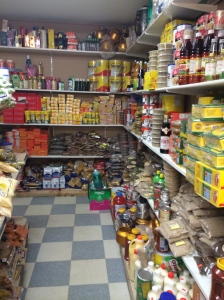After desperately trying to find Global Markets, the once halal certified grocery store in Burlington, which no longer exists, I pulled up in front of the Community Halal Store on North Avenue. When I asked the employee there about the Global Markets store, he told me that he had never heard of it, and when I asked him if his store was the only store that sold halal products in the area, he said that it was “one of two, I think.” Thus I began to wonder how easy it was to come across halal foods in Burlington, or maybe just as someone who does not normally seek these products, I just did not know where to look.

Image credit: http://www.7dvt.com/files/imagecache/articles-sidebar-image/food-halaalmarket-AD.jpg
My interviewee has lived in Vermont for 8 years but is originally from Somalia. He was raised eating only halal foods and keeps halal for “mostly religious reasons.”
He explained that the store serves “the whole community, the Muslim community from around the globe. The people from Pakistan, Somalia, Iran, Tibet all need halal stuff. They don’t want to eat meat killed in a certain way.” The owner of the store, in a 2009 article in Seven Days “considers himself lucky to help connect all the cultures that populate North Street” (Levitt 2009).
Despite the store’s name though not every who enters are looking to buy halal foods. The employee explained, “The customers are very varied. People keeping halal only need specific meat. We serve the whole community, white Americans, black Americans…” The Seven Days article, which includes an interview with the store owner, explains that the store carries more than just meat and provides foodstuffs from other cultures than just Somalia. “Everybody comes here,’ he says. ‘This is a multinational store” and additionally “a fair number of native-born Americans also make their way to the store” (Levitt 2009).
Several other aspects of the interview surprised me as well. One of the first questions I asked was whether halal foods are more expensive than non-halal foods and he said “No, the same. Not that expensive, only maybe the meat.” Additionally when I asked him about the halal certification I had read about online and if the Community Halal Store was certified he didn’t seem to know what I was referring to.
I ended the interview by asking him what I should make if I were to make just one halal dish. He told me, “There are no specific halal recipes. We use just halal ingredients targeting red meat and no alcohol.” So instead I received a Somalian suggestion of soup with either goat meat or beef.
Rahim, Asad. (2013, Nov. 4). Personal Interview.
Levitt, Alice. “Seven Days: Vermont’s Independent Voice.” Somali Tastes. N.p., 12 Aug. 2009. Web.


I find it really fascinating and surprising that most halal foods, except for meat, are the same price as other goods. I would have assumed that halal goods would have an increased price because of transportation, distribution, or the necessary conditions to produce certain halal goods. I would be interested in finding out the different types halal of goods that the store carries and how each good qualifies as halal. It would also be interesting to see how the immigrant and refugee demographics of Burlington impacts the number of global and ethnic food markets in the area and the population’s ability to access to culturally appropriate food items.